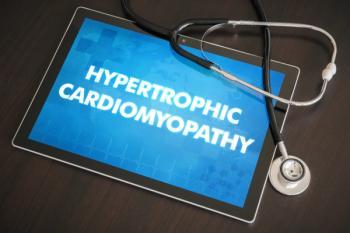
Studies of famotidine demonstrate improvement in cardiac symptoms of chronic heart failure
Two studies of the effects of famotidine in patients with chronic heart failure (CHF) have demonstrated that the treatment improves cardiac symptoms of CHF, including ventricular remodeling. Famotidine has not been approved by FDA for treatment of CHF.
Two studies of the effects of famotidine in patients with chronic heart failure (CHF) have demonstrated that the treatment improves cardiac symptoms of CHF, including ventricular remodeling. Famotidine has not been approved by FDA for treatment of CHF.
The potential cardioprotective effect observed could be because of famotidine's blockade of histamine H2 receptors in the heart, and its ability to decrease both blood pressure and heart rate in patients appears similar to the load-reduction–dependent and–independent mechanisms employed by beta blockers and angiotensin-converting enzyme (ACE) inhibitors in CHF patients, according to the authors of a study published in the Journal of the American College of Cardiology.
Researchers initially performed a retrospective study of 1,104 consecutive eligible patients admitted for CHF treatment from January 2002 to April 2004 at the National Cardiovascular Center in Suita, Osaka, Japan. Patients were required to meet the following criteria: clinical evidence of heart failure despite conventional therapy, 2-dimensional echocardiography assessment indicating a level of left ventricular fractional shortening (FS) <30%, New York Heart Association (NYHA) functional classifications of II to III, and cardiac stabilization for 2 months after discharge. Patients who had received famotidine 20 to 40 mg were enrolled in the treatment group (n=159), and a control group of 159 patients who received a gastritis treatment that did not block histamine H2 receptors was matched based on age, sex, and cause of CHF.
Because results from the retrospective study indicated a potential benefit in CHF, researchers subsequently performed a 6-month, open-label, prospective study of 50 patients with both gastroesophageal reflux disease (GERD) and CHF; this study compared famotidine 30 mg/d with teprenone, a non–histamine-blocking anti-ulcer medication used in Japan, 150 mg/d. Teprenone is not approved by FDA for use in the United States.
At baseline, patients were randomized into the 2 treatment groups (n=25 for each group) after meeting the following criteria: existence of GERD, clinical evidence of heart failure despite conventional therapy, and 2-dimensional echocardiography assessment in-dicating a level of left ventricular FS <30%. All 50 patients enrolled also had NYHA functional classifications of II to III. Patients in the prospective study were treated with beta blockers and ACE inhibitors for 3 months before baseline screening and were permitted to continue treatment with beta blockers, ACE inhibitors, and diuretics during the treatment period. No significant differences in age, gender, or concurrent medications were observed between the 2 treatment groups.
After treatment, patients who received famotidine demonstrated cardiac function improvements, including a slight decrease in both systolic and diastolic blood pressure compared with those measures before treatment (systolic, 107±3 mmHg vs 112±3 mmHg; P<.01; diastolic, 60±3 mmHg vs 67±2 mmHg; P<.05). Researchers also observed a decrease in heart rate in patients after famotidine treatment (79±2 min–1 vs 83±2 min–1 ; P<.05) and improved functional capacity as assessed by plasma BNP levels and NYHA functional class (P<.05 for both). Cardiac performance improved in the patients who were administered famotidine, with no changes observed in FS and decreased left ventricular end-systolic and -diastolic volumes after treatment (P<.05 for all). Patients in the famotidine group also demonstrated a lower frequency of readmission to the hospital because of worsening CHF (1 vs 6; P<.05).
No changes in blood pressure measurements, heart rate, plasma BNP levels, or NYHA functional class were observed before and after the 24-week treatment period for those patients in the teprenone control group.
Both medications were well tolerated through the duration of the study; no patients died during the study, and doses of beta blockers, ACE inhibitors, and diuretics did not change during the course of the study.
Study limitations included the small sample size, the different severities in CHF pathophysiology observed in the retrospective study and the prospective study, and the potential interaction of gastritis with CHF, which could confound the observed effects of histamine blockade.
The idea that famotidine's ability to block histamine H2 receptors could prove beneficial in patients with CHF is intriguing and follows a straightforward rationale, but the connection between histamine, renin-producing mast cells in the heart, and heart failure still warrants further exploration, stated Gary S. Francis, MD, FACC, and W.H. Wilson Tang, MD, FACC, of the Cleveland Clinic in Cleveland, Ohio, in an editorial accompanying the publication of the study results.
"We do not know what the quantitative contribution of mast cells is to the syndrome of heart failure," Drs Francis and Tang said. "No one is recommending famotidine or any other histamine receptor blockers to treat patients with heart failure based simply on the existing information."
SOURCES Kim J, Ogai A, Nakatani S, et al. Impact of blockade of histamine H2 receptors on chronic heart failure revealed by retrospective and prospective randomized studies. J Am Coll Cardiol. 2006;48:1378–1384.
Francis GS, Tang WHW. Histamine, mast cells, and heart failure: Is there a connection? J Am Coll Cardiol. 2006;48:1385–1386.
Newsletter
Get the latest industry news, event updates, and more from Managed healthcare Executive.

























